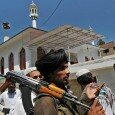By Yasser Latif Hamdani –
The need for nation-building within a democratic, religiously informed framework
The Constitution of Pakistan 1973 seeks to create a democratic government of the people of Pakistan, at once respectful of fundamental rights and equality as well as Islamic principles. On 11 May, Pakistanis proved that they want a democratic state in which governments are changed through the ballot and not the bullet. But the Taliban continues to insist that Pakistan remains an Islamic state. In 2013, Pakistan’s inherent contradictions continued to weigh heavily on the nation state and its citizens.
The role of Islam in the Pakistani constitution is considered by many to be a settled question. The titles of both president and prime minister are closed to non-Muslims, as prescribed by Article 260. Additionally, no legislation repugnant to Islam can be passed. There is a Council of Islamic Ideology and a Federal Shariat Court to determine matters of religion. Despite this, religion continues to be a source of tension within state machinery. Meanwhile, the secular provisions of the constitution seem to work just fine.
Religion continues to be a source of tension, while the secular provisions of the constitution seem to work just fine
However, provisions made for the Islamic element of Pakistan’s governance are deemed insufficient by those for whose benefit they were created in the first place. The Al Qaeda terrorist and ideologue, Ayman Al Zawahiri, wrote a 2009 treatise which argued that, despite appearances, the constitution remained un-Islamic, due to its parliamentary system and because its Islamic provisions could be amended by a two-thirds majority. His view is almost universally accepted within the Taliban, and it is on this basis that they consider the state to be a legitimate infidel target.
This is what makes the idea of talking to the Taliban seem so futile. The constitution states that the existence of private militias is unlawful. In turn, the Taliban argue that their final demand is an end to constitutional governance in Pakistan, to be replaced by an Islamic theocracy in which the Taliban act as judge, jury and executioner. Under such circumstances, the cries for peace talks are akin to sounding out within an echo chamber of self-delusion.
 Another manifestation of the ideological battles within Pakistan is the issue of drones. The hyper-nationalist argument goes that the US is violating Pakistan’s national sovereignty by using drones against terrorist elements in Pakistani territory. The humanitarian argument is that the collateral damage is unacceptable.
Another manifestation of the ideological battles within Pakistan is the issue of drones. The hyper-nationalist argument goes that the US is violating Pakistan’s national sovereignty by using drones against terrorist elements in Pakistani territory. The humanitarian argument is that the collateral damage is unacceptable.
But there is no question of sovereignty if foreign militants occupy a certain area of Pakistan, and use it as a base for both domestic and international terrorism – for instance in Afghanistan. Whatever claim of sovereignty we have are in any event undermined by Pakistani military’s boneheaded insistence that the Durand Line is irrelevant because there are Pashtun Muslims on both sides. Pakistan needs to develop a consistent line on its Afghan border policy before it can begin to address other issues of sovereignty.
The humanitarian argument is much more valid: any collateral damage is unacceptable. However, many from tribal areas argue that drone strikes have driven the Taliban leadership underground. Successful attacks have helped curb militancy and terrorist attacks in Pakistan, but it must also be remembered that the Pakistani Air Force has also carried out thousands of its own strikes in tribal areas. The collateral damage from carpet-bombing is likely to be higher than more targeted drone strikes. If these militants are to be targeted at all, then the only alternative to the aerial route would be boots on the ground. In this instance the damage is again likely to be even more severe and intolerable.
Unsurprisingly, drone strikes are a deeply politicised issue in Pakistan. Tehreek-e-Insaf – under the leadership of Imran Khan – has so far been unable to overcome the multifarious problems of confronting the Khyber Pakhtunkhwa province. It now seeks to mobilise the people against the central government’s position on drones. Its ally, the Jamaat-e-Islami, has also been ratcheting up its rhetoric. Munawar Hassan’s statement declaring that the army’s soldiers should not be made martyrs in the war against the Taliban has been almost universally condemned, especially by the Jamaat’s former bedfellow – the military itself.
What they forget, however, is that there is no substantive inconsistency between Abdul Qader Mollah fighting alongside the Pakistani Army in 1971 and Munawar Hassan condemning the army for its war on the Taliban. Jamaat-e-Islami’s vision has always been one of global Islamic revolution: beyond its own manipulation, it was never interested in the Pakistani nation-state.
Maududi opposed both Pakistan’s creation and earliest forays into Kashmir. The unique circumstances of 1970 brought Yahya Khan’s regime closer to Jamaat-e-Islami in order to rein in Mujib’s Awami League in the East and Bhutto’s PPP in the West. Ties between the military and the Jamaat were further strengthened as a consequence of the Afghan Jihad. But the Jamaat-e-Islami was never a nationalist party committed to Pakistan: it was always an ideological Islamic revolutionary (or counter-revoluntary) party, committed to violent reform and the revival of Islam. It was only natural that it would learn to bite the hand that feeds it.
The narrative that Pakistan was founded in the name of Islam trumps all, despite the fact that history tells a different story
The success of a state can be measured by the experiences of those living on its margins. In Pakistan, the Shia sect has been a victim of continuing violence. Christians and Hindus have faced sporadic bouts of violence and forced conversions, but these groups still continue to find some positive representation. They still have a voice.
But that voice has been denied to the Ahmadi sect, declared as distinct from Islam in a parliament led by secular and left-leaning parties in 1974. In a country obsessed with keeping up its Islamic appearances, the concerns of minorities – sectarian, religious or otherwise –have been swept under the carpet. The narrative that Pakistan was founded in the name of Islam trumps all, despite the fact that history tells a different story.
On a political level, Pakistan must stumble along the path of democracy. On an ideological level the time has come to reconsider its narrative on Islam, and the religiosity of its system of governance. But this cannot happen unless there is a sea change in the thinking of the army, which must be mindful of the fact that it is a national army and not the army of the Islamic Ummah. Only then can we begin to address the inconsistencies in our national psyche, and the conflicting interests represented in the constitution.
The writer is a lawyer based in Lahore. He is the author of the book Jinnah: Myth and Reality. He tweets @therealylh































































































